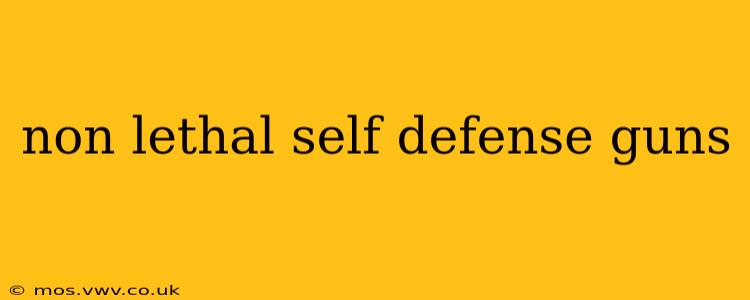Choosing the right self-defense tool is a crucial decision, demanding careful consideration of effectiveness, legality, and personal responsibility. While lethal firearms offer potent protection, many individuals prefer non-lethal options, prioritizing safety and minimizing the risk of causing permanent harm. This guide explores the various types of non-lethal self-defense guns available, addressing key considerations for responsible ownership and usage.
What are Non-Lethal Self-Defense Guns?
Non-lethal self-defense guns are designed to incapacitate an attacker without causing death or serious injury. They utilize various mechanisms to achieve this, including deploying projectiles like rubber bullets, pepper spray, or tasers, or employing sound or light-based deterrents. It’s crucial to understand that while "non-lethal" aims to minimize harm, there's always a potential for unintended consequences, and responsible use is paramount.
Types of Non-Lethal Self-Defense Guns
Several options exist within the realm of non-lethal self-defense, each with its own advantages and disadvantages:
1. Pepper Spray Guns
Pepper spray guns offer a controlled and accurate delivery of incapacitating pepper spray over a greater distance than traditional canisters. This allows for a safer approach, particularly in confrontational situations.
2. Air Guns (Pellet Guns, BB Guns)
These guns fire projectiles at lower velocities than firearms, causing less severe injuries. While commonly used for recreational purposes, some models can offer a degree of self-defense utility. However, their effectiveness depends heavily on the target and the specific projectile. Misuse can still lead to serious injury.
3. Tasers (Stun Guns)
Tasers deliver a high-voltage electrical shock to temporarily incapacitate an attacker. They are effective in close-range situations, but their range is limited. The effectiveness can be reduced by clothing or other factors. Laws regarding the ownership and usage of tasers vary widely by location.
4. Less-Lethal Launchers (Rubber Bullets, Beanbag Rounds)
These weapons fire projectiles designed to incapacitate with blunt force. They often require more training and responsible handling due to their potential for causing injury. Their use is generally restricted to law enforcement and trained personnel in many jurisdictions.
5. Sound Devices
While not strictly "guns," high-decibel sound devices can startle and disorient attackers, providing a window of opportunity to escape. Their effectiveness is dependent on the situation and the attacker’s response.
Are Non-Lethal Self-Defense Guns Legal?
Legality varies significantly by jurisdiction. Laws governing the ownership, carrying, and use of non-lethal self-defense weapons differ drastically between states, counties, and even cities. It is absolutely crucial to check the specific laws in your area before purchasing or carrying any self-defense weapon. Failure to comply with local laws can result in severe legal penalties.
How Effective are Non-Lethal Self-Defense Guns?
Effectiveness is dependent on many factors, including the specific weapon, the attacker, the situation, and the user's training and skill. No self-defense weapon guarantees complete protection. Even non-lethal weapons can cause injuries, so responsible use is key.
What are the Risks and Limitations of Non-Lethal Self-Defense Weapons?
While designed to be less lethal, non-lethal self-defense weapons still carry risks:
- Accidental injury: Misuse can lead to injury to the user or bystanders.
- Ineffectiveness: The weapon may not be effective against a determined attacker.
- Escalation: Use of a self-defense weapon might escalate the situation.
- Legal ramifications: Improper use can lead to legal repercussions.
Proper training is critical for maximizing effectiveness and minimizing risks. Consider self-defense courses that incorporate training with the chosen weapon.
Can I Use a Non-Lethal Weapon in Self-Defense?
While the intent behind non-lethal weapons is to minimize harm, the use of any self-defense weapon is subject to legal scrutiny. The legality of using a non-lethal weapon in self-defense depends heavily on the specifics of the situation, including the proportionality of the force used, the threat level, and whether you were acting in reasonable self-defense. Legal counsel should be sought if you've used a self-defense weapon.
This information is for general knowledge and should not be considered legal advice. Always consult with local law enforcement and legal professionals for guidance on the legality and responsible use of self-defense weapons in your area. Remember, responsible ownership and training are paramount to ensuring your safety and the safety of others.
